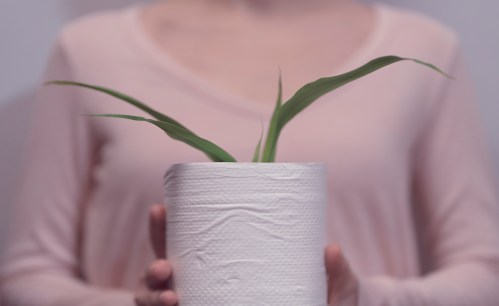There are many reasons people decide to go vegan. Whether you jump on the vegan train for the health benefits, animal welfare, the planet, or because you simply want to try it, get ready to see some changes in the bathroom.
Experts in This Article
plant-based registered dietitian nutritionist and co-founder of Married to Health
gastroenterologist at UCLA Health Torrance
integrative gastroenterologist
While everybody poops, it’s a highly individualized bodily function, and there is no golden rule for what’s normal. But from how often you go to how long it takes, there is a lot your vegan poop habits are telling you.
The gut-poop-plant connection
Like so many health topics, we can’t talk about bowel movements without also mentioning our gut. “More and more research is showing the importance of the microbiome on our GI health,” says Nimah Ather, MD, a gastroenterologist at UCLA Health Torrance.
An unhealthy or off-balance microbiome can wreak havoc on your bathroom habits (think constipation and IBS). Dahlia Marin, RDN, LD, plant-based registered dietitian nutritionist, explains that a gut microbiome out of whack can result in bloating, flatulence, food reactions, bowel movement changes, and even leaky gut.
Here’s where your diet comes in. “Our gut microbiome responds to what we eat,” says Rajiv Sharma, MD, an integrative gastroenterologist. “If we are eating more plant-based foods versus animal-based proteins and animal-based fats, we tend to have healthier gut flora—the bacteria that lives in your intestines—compared to meat-eaters.”
Still, not all vegan diets are created equal. After all, you could live off nothing but chips, crackers, and cereal and technically be a vegan, but that won’t have the good gut effect you’re probably after. “We know that refined foods, saturated fats, and inflammatory substances such as refined sugar, highly-refined grains, artificial dyes, alcohol, high-fat animal products, and tropical oils can negatively impact both the balance of anti-inflammatory and inflammatory microbes living in the gut as well as the integrity of the gut lining,” says Marin.
So, if you’re going to go vegan for gut health benefits, try to opt for whole foods as much as possible. Just because something says “vegan” or “plant-based” on the packaging doesn’t mean it’s healthy.
Here are a few totally normal vegan poop changes
Vegan poop can be summed up in one word: fiber. Swapping out animal products for plant-based foods will immediately increase the amount of fiber you consume on an average day. The added fiber will change your bowel movements in several ways.
You might go more often.
“Fiber is a non-digestible substance by humans,” says Dr. Ather. “This is helpful to increase the frequency of bowel movements as fiber adds bulk to the stool.” The bulkier a stool, the quicker it will pass through your digestive tract.
You’ll probably have softer stools.
Dr. Sharma explains that fiber absorbs water, which makes your stools moist and soft. If you want to visually see why consistency matters, and you’re up for a bit of graphic poop content, Google Bristol Stool Chart. Out of the seven types, your goal should be Type 3 & 4.
You might run into constipation.
“Switching to a fully vegan diet and increasing your fiber intake too fast is not recommended,” says Dr. Ather. The United States Department of Agriculture recommends women consume about 25 grams of fiber per day and 38 grams for men. As you switch to a vegan diet, Marin says that adding in five grams of fiber per week can help you avoid constipation, excessive gas, and other tummy discomforts.
It may be easier to go.
Provided you’re not dealing with consipation, Dr. Sharma says that plant proteins are simpler and easier to digest than animal proteins. “Meat eaters tend to be more constipated, which means they will strain more,” he says. “Removing meat from the diet will allow the bowel movements to be softer and lighter.”
Let’s talk about gas
It’s time to address the vegan flatulence effect. For many people, a vegan diet can cause more gas and other related stomach issues. “Since the high fiber food is not digested by your body, it is left for bacteria to digest, which leads to gas as a by-product,” says Dr. Ather. “This can lead to bloating, flatulence, and abdominal discomfort.”
There’s no reason to worry about the increase in gas. The more whole foods that appear in your diet, “the happier your microbiome will be because bacteria love the good and healthy food since it is less toxic to the gut lining and less toxic to the bacteria,” says Dr. Sharma.
Still, that doesn’t mean you want to be flatulating all over town. Don’t worry; relief is in sight. “The good thing is the body will eventually adjust,” says Dr. Ather. “Your gut bacteria will eventually change, and these symptoms should improve.”
And if you were all about dairy before going vegan, you may actually see a decrease in gas. “Many people are lactose intolerant, so they are unable to break down these products, which leads to uncomfortable GI symptoms,” says Dr. Ather. “For many people, removal of dairy can regulate bowel habits and decrease flatulence and bloating.”
Ultimately, changing your diet impacts your entire body, and a few changes in your bathroom behavior are expected. If you’re concerned, consider chatting with a registered dietitian or nutritionist about your goals to make sure you’re easing into a plant-based diet mindfully.
Oh hi! You look like someone who loves free workouts, discounts for cutting-edge wellness brands, and exclusive Well+Good content. Sign up for Well+, our online community of wellness insiders, and unlock your rewards instantly.
Sign Up for Our Daily Newsletter
Get all the latest in wellness, trends, food, fitness, beauty, and more delivered right to your inbox.
Got it, you've been added to our email list.











